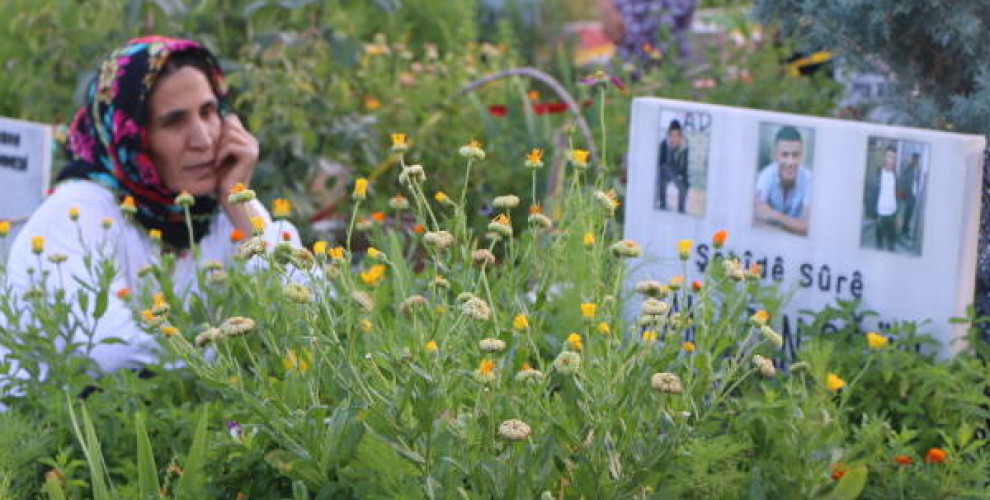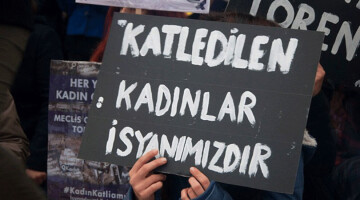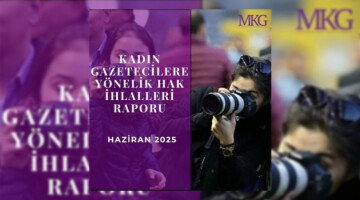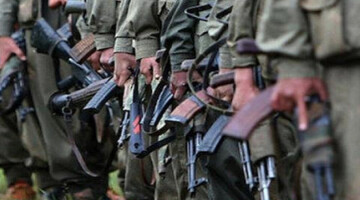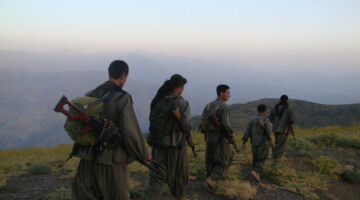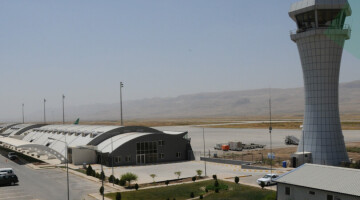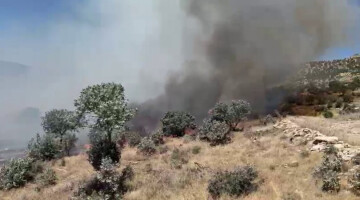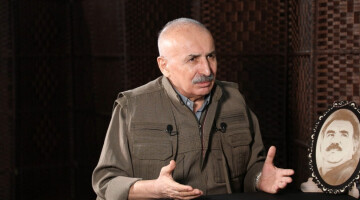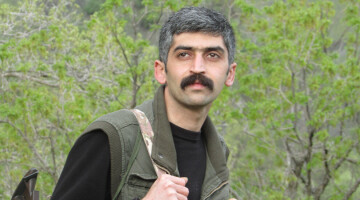It's holiday again... Again the days which surge heartrending feelings of the families who have lost their children in Sur. "It is enough, we lost already our children, but other families should be spared." These words are voiced desperately by those families. Looking at the graves of the children who were still in their springtime of life, the question arises to one's mind whether one could possibly just regard them as dead. Unlike other peers-of-age they were giving away their lives without hesitation for what they believed in, they who bore the biggest souls are to be shown great gratitude and honor. The gravestones picturing their smiling faces which reflect the story of their life, seem to draw one's attention. Their families' violets, daisies and orchids adorn their graves into flowerbeds. They planted their children's favourite flowers in a hope to have the flowers spring to life in their children's souls.
They visit the martyrs' cemetery in Yeniköy every Thursday until the graveyard turned for them into some part of their home. Entering the cemetery, the families water the flowers together, as they do the cleaning of the graves, before they turn to head to their own children's gravestones to hold them in embracement. Then they take to tell of their children's life while the visitors listen to their stories, not uttering one word. The young children of the deceased elder siblings are skipping through the site, where the mothers embrace for the third time their children's gravestones on this day of festivity.
Where the martyrs of Sur are buried side by side, there is the flower-blazoned grave of Azad Kaya to be seen. Azad's mother is sitting there, whispering to Azad while shedding tears. She seems to have planted a chaplet of ivy at his grave because it doesn't get affected by the region's hot weather. She takes care of her son's grave while handing bread and apples to the children which she fetched from the village. The lamentation she brings forth fills one with deep grief. Upon the question to tell a bit of her son, she just replies, "What should I tell of? What should that be good for? I don't know to speak anymore. My grief is doing enough to me already", whereafter she just continued to whisper to her son.
Then there is Nahide Duman, the mother of Sinan Duman (Felat Amed) who fell in Amed a martyr at the age of 21. She sat with her children and grandchildren by the grave and driven by the hope for peace to draw near, she starts to talk: "Other mothers have to be spared from the agony, which we suffer from having lost our children. The lament for children is something too heavy to bear. People still keep getting killed. Children are ran over by armored vehicles. They killed four, five people of the same family by their armored vehicles. It is a sin against the whole world and justice of religions. Real Muslims don't do such things. The AKP claims to be Muslim. Those who murder people can never be Muslims. It is a crime! Why do you keep killing Kurds. We mothers yearn for peace.
The religious feast is there but why would it concern us? Nothing of a taste of summer, nothing of holy days or festivities have been left for us. I have lost my child, what more grievous could possibly exist for a mother? Nothing can fill the emptiness left behind my lost child. I visit his grave each day, but no sound comes out of the cold earth. My child will never return and let me hear his voice. How should I put it? Yes, we come to sit here for hours next to our buried children, but it still gives me a relief to touch the ground where my child rests. I water his grave to keep the earth from drying and my son's body from an early decomposition. May befall worse upon those who did this to us!."
We are turning to Elif Öğüt, the mother of Ramazan Öğüt, who gives her child's picture a kiss. She calls out to her son, her voice trembling: "Get up my son, it's the time of the holy day. See, your friends are already ahead dressed in their robes. Come let us get you yours too. My son, the third holy day is passing that I didn't see you. But I come everyday to your grave. I feel lost and cannot bear being away. My home is here."
She turns to us and shares her feelings, telling that she deals with the situation better when being with the other families who, as her, lost their children. She continues: "I keep the clothes of my son Ramazan still in my coat closet. It's everytime when I hear of deaths in news that I get reminded of my son. It's enough, all that dying! They shall stop killing our children, stop making mothers cry. We can not take it anymore. I cannot bear, I don't want to keep coming to know other mothers here in this way. Each time I visit this place and see mothers who have lost their children recently.., no it's causing too much pain for us. At least let peace be for the sake of this holy day."
After that, she starts to tell us how she continued to live through the holy days after her son's decease: "I do not buy any festive robes for my children anymore. All these festivities, they do not mean anything to me anymore. The state shall hear our voices and stop killing our people. Everyone is someone's child. They shall just think of their own children and try to imagine calling them 'terrorists'. They shall stop causing us grief. If the Kurds had united then, Sur wouldn't have been razed and our children wouldn't have been killed. I as a heart-torn mother will never forgive those who killed my son even on this holy day of forgiveness. I wish them to live through the very same anguish."
We meet Gülsüm Polat, the mother of Eşref Polat, who is about to water the lilies she emblazed her son's grave with. She believes in the flowers to tend her child. She tells us about her grief of missing the third time where she again cannot embrace her son during the festivity. Telling us that she will suffer the agony of her son's loss for her whole life, she continues: "My son was someone who wouldn't eat a bite without sharing it. My compassionate son struggled for a change of life. But children keep getting killed. It's enough, enough with that! They aren't even during the holy days enough of bloodshed! I will spend my whole life the festivities with my son. And when I die I shall be buried next to him. My son is lost, my heart, everything is lost. His father is ill and cannot even visit his grave. I come alone and tell my son what sorrows I have."
And then there is Kardriye Morgül with her seven years old daughter visiting the grave of her son Cihat Morgül, who as well lost his life in Amed's Sur district. She exclaims, "Which holy day didn't they come to destroy?", adding, that after two years of her dear child's death her wound is still throbbing as it did in the beginning. Then she says, "My daughter keeps asking about her brother. For the sake of the holy day they shall stop causing pain for us Kurds."
Lağiye Yılmaz, who travels each Eid Al-Fitr from Istanbul to Amed to visit her daughter Jiyan Yilmaz at the grave told us: "Everyone spends the feast at home with their loved ones, but we spend our feast sitting by our children's bodies. The death of these children have to be retaliated. This fire inferno needs to be quenched. Erdogan is responsible for all killings. We as Kurds need to unite and stand up for our martyrs' sake."

